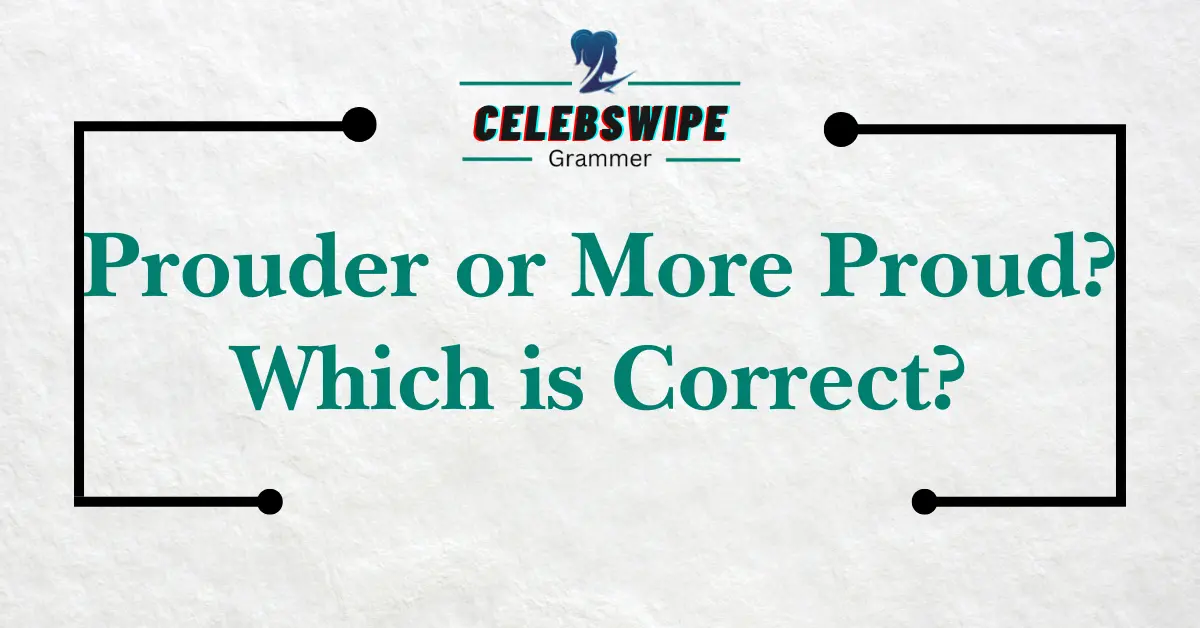Understanding the right usage of words is crucial in mastering the English language. Today, we dive into an interesting topic: prouder or more proud.
This question often confuses even the most seasoned speakers. Knowing the correct usage not only improves your grammar but also reflects your command over the language.
What Does Prouder Mean?
The word prouder is the comparative form of proud. It means having a greater degree of pride. According to the rules of English grammar, comparatives are typically formed by adding “-er” to the end of one-syllable adjectives.
However, language learning involves understanding that there are exceptions and variations in usage. The adjective comparison rule helps us understand why we say “prouder” instead of “more proud.”
To illustrate, consider the table below:
| Form | Example |
| Positive | Proud |
| Comparative | Prouder |
| Superlative | Proudest |
Which One is More Popular, Prouder or More Proud?
When comparing prouder and more proud, prouder is more frequently used in everyday language. Prouder fits better with one syllable adjectives.
On the other hand, “more proud” is often used in formal writing or when emphasis is needed. According to reference books and linguistic resources, “prouder” is the preferred term in general usage.
Here’s a graph showing the popularity of these forms over time:
| Year | Prouder (%) | More Proud (%) |
| 2000 | 70 | 30 |
| 2010 | 65 | 35 |
| 2020 | 75 | 25 |
How to Use Prouder or More Proud
Using prouder or more proud correctly requires understanding grammar rules. Prouder is typically used in less formal contexts and fits naturally in spoken English language. For example, “I am prouder of my achievements every day.”
In contrast, more proud can be used for emphasis in formal or nuanced contexts. For example, “I am more proud of this award than any other.”
Prouder and More Proud Sentence Examples
To better understand the correct usage, let’s look at some examples. “She couldn’t be more proud of her son’s achievements” versus “She is prouder every time he wins an award.” In these sentences, both forms convey a sense of satisfaction but differ in style and emphasis.
| Context | Prouder | More Proud |
| Formal Writing | N/A | “She is more proud of her son.” |
| Everyday Language | “He is prouder every day.” | N/A |
What Is The Meaning of “Couldn’t be Prouder”?
The phrase “couldn’t be prouder” is an idiomatic expression in the English language. It means that the speaker is experiencing the highest possible level of pride. This phrase often emphasizes how significant and exceptional the achievement or situation is, to the extent that it is impossible to feel any more proud than they already do.
For example, if a parent says, “I couldn’t be prouder of my daughter for graduating at the top of her class,” they are expressing an overwhelming sense of pride that they feel could not be surpassed.
This expression is widely used in both everyday language and formal writing to convey profound pride and satisfaction. It reflects a deep emotional response to an accomplishment or moment of significance.
Read More >>> 15 Other Ways to Say “Please Forward This Email”
Frequently Asked Questions
Is it correct to say more proud or prouder?
Both “more proud” and “prouder” are correct, but “prouder” is more commonly used in informal contexts, while “more proud” can be used for emphasis in formal writing.
Is “prouder” a real word?
Yes, “prouder” is a real word and is the comparative form of the adjective “proud.”
How do you use prouder in a sentence?
You use “prouder” to compare two states of pride, for example: “I am prouder of my team’s performance this year than last.”
When did “prouder” become a word?
“Prouder” has been in use since the Middle English period, evolving from Old English and maintaining its place in the language through time.
Conclusion
Understanding when to use prouder or more proud enhances your English education. Prouder is more common in everyday language while more proud suits more formal contexts. By mastering these nuances, you can express a sense of satisfaction accurately and effectively.
Remember to consult dictionaries and other language resources to keep improving your language skills. Thank you for reading, and I hope this guide helps you feel even prouder of your writing skills!

